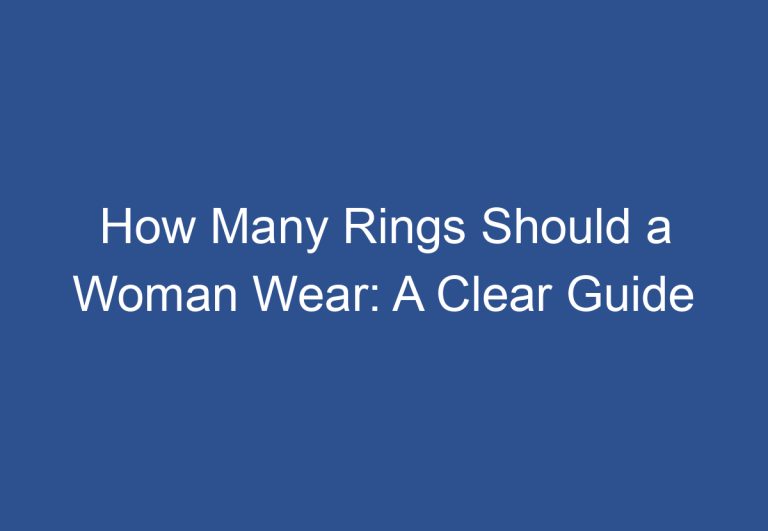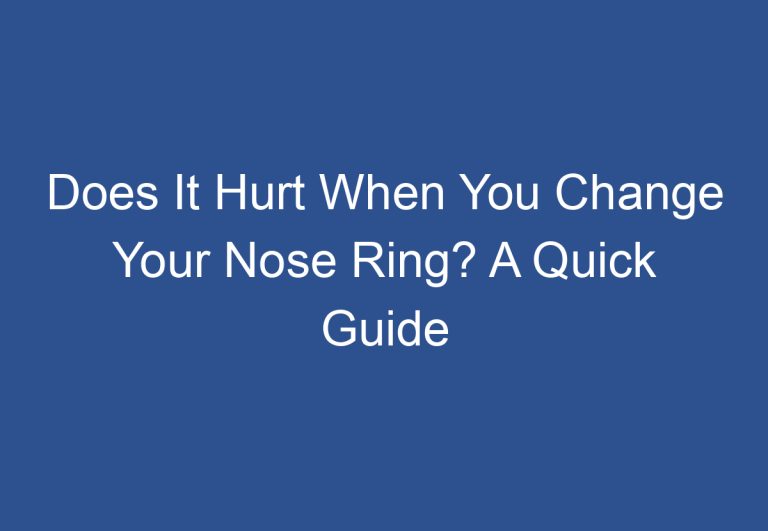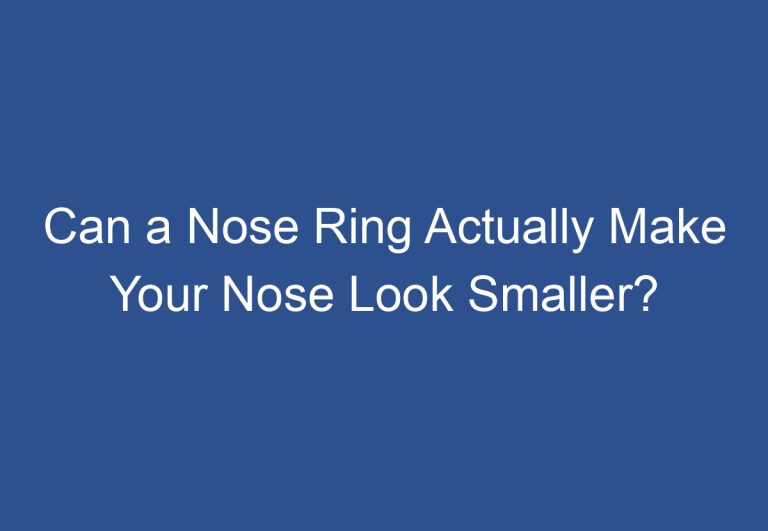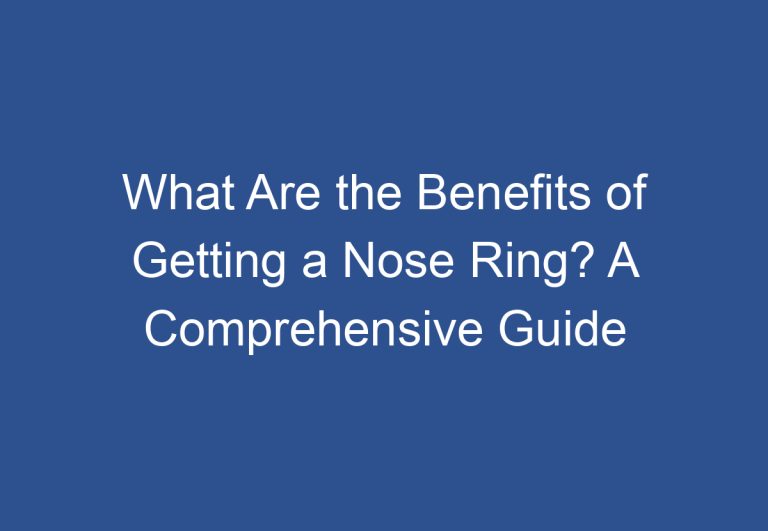Can a Nose Ring Infection Spread? Exploring the Risks and Prevention Measures
A nose ring infection can be a painful and uncomfortable experience. While it is not uncommon for people to experience an infection after getting a nose piercing, it is important to understand the potential risks involved. One of the most pressing concerns for people with a nose ring infection is whether or not it can spread to other parts of the body.

In general, a nose ring infection is caused by bacteria entering the wound created by the piercing. The bacteria can cause inflammation, redness, and pain around the piercing site. While it is possible for the infection to spread to other parts of the nose, it is less likely to spread to other parts of the body. However, it is important to seek medical attention if the infection worsens or if you experience any unusual symptoms.
Symptoms of a nose ring infection can include redness, swelling, and tenderness around the piercing site. You may also notice pus or discharge coming from the piercing. In some cases, the infection can cause a fever or other systemic symptoms. If you experience any of these symptoms, it is important to seek medical attention right away to prevent the infection from spreading and causing further complications.
Understanding Nose Ring Infections

Nose piercings are a popular form of body art that involves the insertion of jewelry through a hole in the nostril. While it can be an exciting way to express oneself, it is important to understand that nose piercings can also lead to infections if proper care is not taken. In this section, we will discuss the causes, symptoms, prevention, treatment, and healing of nose ring infections.
Causes and Symptoms
Nose ring infections are caused by bacteria that enter the piercing site through the jewelry or from touching the area with dirty hands. Some common symptoms of an infected nose piercing include tenderness, pain, redness, swelling, fever, discharge of pus, and throbbing. In some cases, an allergic reaction to the jewelry can also cause an infection.
Prevention and Aftercare
Preventing an infection from occurring in the first place is key to maintaining a healthy nose piercing. Aftercare is crucial in preventing infections and includes cleaning the piercing site with soap and water or a saline solution at least twice a day. Avoid touching the piercing with dirty hands and keep the area dry. It is also important to avoid swimming or soaking in water sources such as hot tubs until the piercing has healed. Additionally, using hypoallergenic jewelry and practicing good hygiene can help prevent infections.
When to See a Doctor
If an infection is suspected, it is important to seek medical attention from a healthcare provider or dermatologist. Signs that the infection may be serious include fever, excessive redness, swelling, and discharge of pus. In some cases, the infection can lead to an abscess or sepsis, which can be life-threatening if left untreated.
Treatment Options
Treatment for a nose ring infection may include antibiotics, either oral or topical, depending on the severity of the infection. Home remedies such as a warm compress or a sea salt solution can also help reduce discomfort and inflammation. It is important to avoid using skincare products or rubbing alcohol on the piercing site, as this can irritate the area and delay healing.
Healing and Recovery
The healing time for a nose piercing infection can vary depending on the severity of the infection. In some cases, scar tissue may form, and the piercing may take longer to heal. It is important to continue practicing good aftercare and avoiding trauma to the area to ensure proper healing. In some cases, a keloid or granuloma may form, which may require medical treatment.
In conclusion, nose ring infections can be prevented by practicing good aftercare, using hypoallergenic jewelry, and seeking medical attention if an infection is suspected. With proper care, a nose piercing can heal without complications and be a beautiful form of self-expression.
Choosing the Right Jewelry and Piercing Care

When it comes to preventing the spread of a nose ring infection, choosing the right jewelry and taking proper care of the piercing site are crucial. In this section, we will discuss the different factors to consider when selecting jewelry and the steps to take to maintain good piercing hygiene.
Jewelry Materials and Allergic Reactions
One of the most important things to consider when choosing jewelry is the material it is made of. Some people have allergic reactions to certain metals, such as nickel, which is commonly used in jewelry. To avoid an allergic reaction, it is important to choose hypoallergenic jewelry made from materials such as gold or titanium.
Proper Piercing Maintenance
Maintaining good hygiene is essential to prevent the spread of infection. This includes washing hands thoroughly before touching the piercing site and cleaning the piercing regularly with soap and water. It is also important to avoid touching the piercing with dirty hands or allowing others to touch it.
Lifestyle Considerations
Certain lifestyle factors can increase the risk of infection. For example, swimming in water sources such as hot tubs or pools during the first week after getting a nose ring can increase the risk of infection. It is also important to avoid using skincare products or sunscreen on the piercing site until it has fully healed.
Home Remedies and Alternative Treatments
In addition to proper piercing care, there are several home remedies and alternative treatments that can help prevent the spread of infection. One effective method is to use a sea salt solution to clean the piercing site. This can be done by mixing sea salt with warm water and applying it to the piercing site with a cotton ball. Other remedies include using hydrogen peroxide, chamomile tea, aloe vera gel, or tea tree oil.
By following these guidelines and taking proper care of the nose ring, individuals can significantly reduce the risk of infection and prevent it from spreading.
Frequently Asked Questions

What are the signs of an infected nose piercing?
An infected nose piercing can have several signs, including swelling, redness, tenderness, and pain around the piercing site. There may also be discharge of pus or other fluids, a foul odor, and the formation of a crust around the piercing. If you experience any of these symptoms, it is important to seek medical attention.
How can you differentiate between normal healing and an infection in a nose piercing?
It can sometimes be difficult to differentiate between normal healing and an infection in a nose piercing. However, if the pain, redness, and swelling persist for more than a few days, and if there is discharge of pus or other fluids, it is likely that the piercing is infected. If you are unsure whether your piercing is infected or not, it is always best to seek medical advice.
What are the risks of an untreated nose piercing infection?
If left untreated, a nose piercing infection can lead to serious complications, including the spread of the infection to other parts of the body. This can lead to conditions such as sepsis, which can be life-threatening. Therefore, it is important to seek medical attention as soon as possible if you suspect that your nose piercing is infected.
How should one treat an infected nose piercing at home?
If you have an infected nose piercing, there are several things that you can do to treat it at home. These include cleaning the piercing site with a saline solution, applying a warm compress to the area, and taking over-the-counter pain medication. However, it is important to seek medical advice if the symptoms persist or worsen.
What is the likelihood of a nose piercing infection leading to sepsis?
While it is rare for a nose piercing infection to lead to sepsis, it can happen if the infection is left untreated for too long. Therefore, it is important to seek medical attention as soon as possible if you suspect that your nose piercing is infected.
How long is the typical duration of a nose piercing infection?
The duration of a nose piercing infection can vary depending on the severity of the infection and how quickly it is treated. In most cases, with proper treatment, the infection should clear up within a few days to a week. However, if the infection is severe or left untreated, it can take longer to heal.






